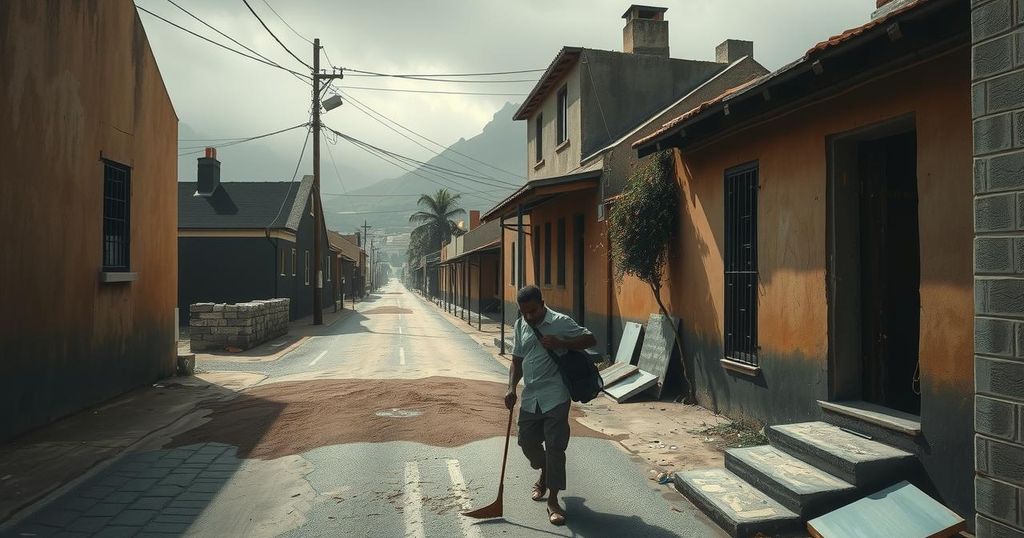Crime
AFRICA, CAPE, CAPE FLATS, CYRIL RAMAPHOSA, DA, DAVIN, DEVON, DEVON AFRICA, FAMILY, GARETH NEWHAM, GOFUNDME, HUMAN INTEREST, INSTITUTE FOR SECURITY STUDIES, JESUS, JOHANNESBURG, JUSTICE AND VIOLENCE PREVENTION PROGRAMME, KELLY AMBER, MURDER, SOUTH AFRICA, UND, UNDEAN, VIOLENCE, WESTERN CAPE
Fatima Khan
0 Comments
South Africa’s Gang Warfare: The Victims Caught in the Crossfire in Cape Town
Cape Town is grappling with rampant gang violence, leading to devastating losses for families. The tragic deaths of children like Davin and Kelly Amber highlight the ongoing crisis linked to historical injustices. Despite government efforts, the entrenched gang presence complicates law enforcement. Pastor Craven Engel works tirelessly in his community, while individuals like Fernando Johnston seek a path to rehabilitation. The cycle of violence continues to challenge these neighborhoods as residents call for hope and systemic change.
In Cape Town, South Africa, the devastating toll of gang violence is painfully evident. On a narrow bed, a heartbroken father, Devon Africa, shows the bullet holes in the wall of his home. These marks bear witness to the tragic moment his four-year-old son, Davin, was killed in a shootout between rival gangs. This incident is part of the broader crisis affecting the Cape Flats, a region plagued by a legacy of apartheid that displaced the non-white population to under-resourced townships. Tragically, Davin is not the only victim; his older sister, Kelly Amber, was killed two years prior when she was just twelve.
Echoing the broader sentiment in the community, Devon’s wife, Undean, reflects on the loss of their children, saying their youngest daughter often asks about her brother, and the couple struggles to explain his absence. “I told her he’s with Jesus in daddy’s heart and in my heart,” she shared. This anguish is commonplace as families across the Cape Flats face similar horrors. Despite numerous promises from police for increased efforts to combat crime, violence continues unabated. Statistics show that the Western Cape, where the Cape Flats are situated, sees the highest rates of gang-related murders in South Africa.
Gang warfare has a deep-rooted history in the region. According to Gareth Newham from the Institute for Security Studies, generations have been raised into gang culture as gangs fill the void left by a neglected state, providing essential support systems. He notes, “They provide food for homes. Money for electricity… school fees.” The gangs’ presence complicates law enforcement efforts, as police struggle to engage with communities deeply intertwined with gang life.
In Hanover Park, located about fifteen kilometers from Wesbank, Pastor Craven Engel is actively working to mediate between gangs and reduce violence. He acknowledges the complex issues faced by communities impoverished by a lack of economic opportunities. “The bulk of the economy comes out of the drug culture,” Engel explains. The consequences of apartheid’s lingering effects and generational trauma manifest in drug addiction, which fuels further violence and strife.
In this area, shootings occur almost daily, often involving young offenders. Newham warns that merely arresting gang members will not alleviate the issue; the cycle of violence will continue as older members are replaced by younger ones eager to defend turf. The death toll keeps rising, raising urgent questions about community safety. Engel recalls a chilling incident where a child was shot multiple times, underscoring the tragedy that permeates daily life.
Despite the challenges, Engel remains committed to his cause. He tirelessly makes calls, seeking peace amidst the chaos. Recently, during a BBC Africa Eye visit, Engel attempted to negotiate a ceasefire between rival gangs. However, such negotiations remain perilous, with gang leaders issuing threats even from prison. “If I want something to happen, then it still happens… I’m a guy that likes to counter if I come under fire,” one gang leader told Engel.
Engel’s program for gang rehabilitation used to receive government funding, but has since experienced financial strain. As a result, he employs various strategies, including sending rehabilitated members to mediate with gangs. He recounts how one reformed gang member is now advocating for peace among rival factions. Yet, in the chaotic world of gangs, the ideals of peace are met with skepticism.
In the midst of this turmoil, many individuals seek a way out. Fernando Johnston, a young gang member, expresses a desire to change his life with Engel’s help. “In this game, there are only two options – it is either you go to jail or you die,” he states. With a hopeful heart, he is ready to embark on a rehabilitation program that aims to steer him away from gang influences.
The emotional toll on families in these communities is profound. Nando’s mother shares her struggles to raise her children amid the pervasive influence of gang culture. “It’s not easy raising four boys on my own… I’m always encouraging him to make a change because I love him very much,” she reveals. Two weeks into his program, Pastor Engel reflects that Nando is stabilizing and staying drug-free, providing a glimmer of hope in a place where despair is the norm.
Yet, for families like Devon Africa’s, the daily reality is fraught with violence and fear. Many community members feel distrustful of the police, further complicating interventions. The pervasive sentiment is that external help will not arrive, as Engel poignantly described, “Nobody is going to come from anywhere to help or save us.” A plea for resilience echoes through these neighborhoods, as individuals aspire to carve out a better future despite the overwhelming challenges they face.
The ongoing gang warfare in Cape Town devastates families, with tragic consequences such as the deaths of children like Davin and Kelly Amber Africa. Despite police reassurances and government initiatives, the ingrained gang culture poses significant obstacles to peace. Community leaders like Pastor Engel strive to mediate and rehabilitate but struggle against a backdrop of entrenched violence and mistrust in law enforcement. Hope occasionally breaks through, as individuals like Fernando Johnston seek change, embodying the community’s deep yearning for peace and a brighter future amidst the turmoil.
Original Source: www.bbc.com




Post Comment